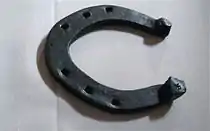pakavs
Latvian

Pakavs
Alternative forms
- (dialectal form) pakava
Etymology
Traditionally considered a borrowing from Russian подко́ва (podkóva), first mentioned (as pakava in 17th-century dictionaries. It is also possible, however, that the word may have been a recent native derivation, from the verb kaut, past tense kavu, in the sense “to hit, to beat,” occasionally used (instead of kalt) in folk songs to mean “to shoe (a horse).”[1]
Noun
pakavs m (1st declension)
- horseshoe (U-shaped metal object used to protect a horse's hooves)
- pakavu naglas ― horseshoe nails
- laimes pakavs ― lucky horseshoe
- piesist pakavu ― to nail a horseshoe on
- apkalt zirgu ar jauniem pakavirem ― to shoe a horse with new horseshoes
Declension
Declension of pakavs (1st declension)
| singular (vienskaitlis) | plural (daudzskaitlis) | |
|---|---|---|
| nominative (nominatīvs) | pakavs | pakavi |
| accusative (akuzatīvs) | pakavu | pakavus |
| genitive (ģenitīvs) | pakava | pakavu |
| dative (datīvs) | pakavam | pakaviem |
| instrumental (instrumentālis) | pakavu | pakaviem |
| locative (lokatīvs) | pakavā | pakavos |
| vocative (vokatīvs) | pakavs | pakavi |
See also
References
- Karulis, Konstantīns (1992), “pakavs”, in Latviešu Etimoloģijas Vārdnīca (in Latvian), Rīga: AVOTS, →ISBN
This article is issued from Wiktionary. The text is licensed under Creative Commons - Attribution - Sharealike. Additional terms may apply for the media files.